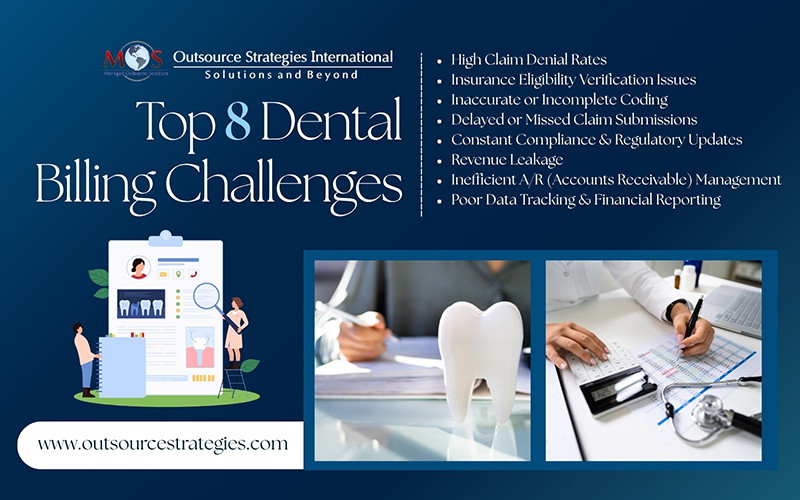Billing for dental services has become increasingly complex due to constantly changing industry regulations, coding updates, and payer-specific requirements. This can have a serious impact on a healthcare organization’s revenue. Outsourcing dental billing is a strategic solution to these challenges. By partnering with third-party billing companies, providers are assured of the services of skilled professionals who focus on accurate, timely claim submissions. These experts help resolve the most common issues that lead to delays, denials, or underpayments, ensuring providers receive appropriate and timely reimbursement.
Understanding the top reasons to outsource your billing process can help your dental practice reduce costs, improve cash flow, and ensure greater billing accuracy. In this post, we discuss the top challenges solved by third-party billers and the solutions they provide to optimize dental revenue cycle management (RCM), reduce denials and maximize reimbursements.
Reach out to our expert team and experience the benefits of professional dental billing services!
Why Dental Billing Is Increasingly Challenging
Several factors combine to make billing for dental services a complex task, which is why they turn to outsourcing:
- Evolving regulatory and payer requirements: Laws and regulations to safeguard patient privacy, ensure quality care, and maintain the integrity of healthcare systems are constantly evolving. It can be challenging for providers to maintain compliance with these laws, regulations, and guidelines that govern medical billing.
- Coding system updates: Coding systems such as ICD-10, CDT and CPT are regularly updated to reflect changes in medical practice, technology, and terminology. For instance, the CDT updates for FY 2025 include ten new codes, twelve revised codes, two deletions, and several policy changes. Similarly, there are over 300 ICD-10 code changes in 2025, including 252 new codes, 13 deletions, and 36 revisions. Keeping up to date with coding changes is crucial for accurate billing, reimbursement, and care delivery.
- Insurance verification: Patient eligibility and benefits checks are a critical but challenging step in the revenue cycle. Inaccurate or incomplete verification can lead to claim denials, delayed payments, and lost revenue. Common issues include outdated patient information, misunderstood coverage terms, and unverified benefits or authorizations. These problems create administrative burdens, upset billing workflows, and impact cash flow. When dental insurance details are not verified correctly in advance, providers risk delivering services that are not covered—resulting in payment delays or write-offs that directly affect the practice’s bottom line.
- Increased claim denials and audits: Claims can be denied due to missing or incorrect information, lack of prior authorization, eligibility issues, and non-covered services. Recent reports suggest that at least 15% of dental claims are denied, with some sources indicating a higher rate, especially for out-of-network claims. ICD-10 Monitor reports that With AI-driven audits on the rise, providers must ensure accurate, complete documentation, as automated systems quickly flag errors or inconsistencies.
- Shortage of experienced in-house billing staff: A shortage of experienced billing staff is a major challenge impacting RCM and increasing the risk of errors and delays. Factors like high turnover, burnout, and difficulties in recruitment and retention account for this shortage.
- Administrative burden on providers: Increased regulations, use of electronic health records (EHRs) and insufficient support staff often lead to physicians dedicating a substantial portion of their workday to administrative tasks such as documentation, prior authorization, billing, and coding. This focus on non-clinical duties takes away from time spent on patient care and is a key reason for provider burnout.
These challenges highlight why many dental professionals choose to outsource their revenue cycle management (RCM) tasks. Partnering with professional third-party billers can solve common medical billing problems, streamline claim submission, improve collections, and reduce errors.
Common Problems Solved by Third-Party Dental Billing Companies
Here are the eight common dental billing challenges and how outsourcing provides the solution:
- High Claim Denial Rates
Coding errors, missing information, or non-compliance with payer rules are the common reasons for claim denials that can significantly impact a healthcare organization’s bottom line.
Third-party billers provide dedicated denial management services. Their experts identify root causes, correct errors promptly, and resubmit claims efficiently to ensure that providers get properly reimbursed. Their billers and coders communicate with clinical staff to ensure accurate documentation and coding, minimizing the risk of preventable denials. Their robust support maximizes revenue and improve practices’ overall financial health.
- Insurance Eligibility Verification
The process of checking dental insurance coverage and benefits can be complex and time-consuming, causing inefficiencies and delays.
Partnering with a dental billing company ensures access to insurance verification specialists and processes. Utilizing a combination of technological solutions, improved data exchange standards, and ongoing communication between healthcare providers and insurance companies, experts ensure accurate and timely verification of dental insurance coverage. This drives accurate and timely billing and prevents denials due to eligibility issues.
- Inaccurate or Incomplete Coding
Coding mistakes such as incorrect CDT codes, mismatched ICD-10 and procedure codes can lead to claim denials, underpayments, delayed payments, and even legal issues.
By outsourcing, dental practitioners gain access to experienced certified medical coders. These professionals work with coding software and other tools to ensure precise, up-to-date coding based on clinical documentation, perform compliance checks, and stay updated with coding guidelines. By implementing audits and quality assurance checks, they identify and correct coding errors before claims submission, reducing risk and maximizing reimbursement.
- Delayed or Missed Claim Submissions
Payers have specific deadlines for claim submission, typically ranging from 90 to 180 days from the date of service or hospital discharge, though some allow up to a year. Many PPOs and HMOs allow 6 to 12 months for claim submission. Medicaid and government plans often have stricter deadlines.
Timely filing is crucial for maintaining practice revenue and complying with insurance policies. However, staffing shortages or administrative overload in practices can cause claims to be filed late or not at all. Failing to submit claims within the specified timeframe can lead to claim denials, impacting revenue and potentially leading to patient dissatisfaction.
Third-party billers implement systems, automation, and processes to track and submit claims promptly—every time, to avoid denials. If a claim is denied for timely filing, they will help providers appeal the decision by providing proof of timely submission and valid reasons for the delay.
- Compliance and Regulatory Changes
As highlighted above, frequent changes to coding systems, payer policies, and government regulations make it difficult for healthcare providers to stay compliant.
Billing companies stay current with all regulatory changes and payer-specific guidelines to help providers ensure compliance and avoid costly penalties or audits. By maintaining compliance with the Health Insurance Portability and Accountability Act (HIPAA) regulations in billing operations, they ensure patient privacy, avoiding fines and legal implications.
- Revenue Leakage
Missed charges, underbilling, and uncollected payments can quietly erode a practice’s revenue. Even efficient practices can lose revenue due to small errors like incomplete data, incorrect coding, or missed follow-ups on denied claims. These issues, known as revenue leakage, add up over time.
Third-party billers implement charge capture audits and revenue tracking processes to ensure every service is billed correctly and fully collected. Their targeted revenue optimization strategies identify and correct gaps, ensuring full reimbursement and reducing operational inefficiencies.
- Accounts Receivable Management
Collecting payments due from insurance companies and patients or accounts receivable (AR) is a major challenge for healthcare providers. It requires regular tracking to identify AR trends and potential issues and actively following up on outstanding claims with insurance companies and patients.
By ensuring efficient AR management, outsourcing dental billing drives a steady cash flow for practices. Third-party billers implement standardized processes for tracking and monitoring AR, including aging reports and follow-up procedures. They set up communication channels with patients and payers to resolve outstanding balances promptly and address any billing issues.
- Data Tracking and Financial Reporting
Without real-time data, practices can struggle to monitor billing performance, track key metrics, or identify bottlenecks, delays or where revenue losses are occurring. This leads to inefficiencies, missed opportunities for improvement, and delayed responses to claim denials or payment issues.
Third-party billers offer detailed analytics and customized reporting to give providers clear visibility into their revenue cycle. By providing real-time insights, they support informed decision-making, helping practices streamline their revenue cycle and maintain financial health.

Outsource Billing to Optimize RCM
The support provided by third-party dental billing companies makes a strong case for outsourcing. The key advantage of partnering with such experts is that it gives providers immediate access to experienced professionals without the cost or risk of staffing in-house. By opting to outsource, practices can reduce administrative burdens and billing errors, improve cash flow, and divert resources to what really matters: patient care.
Outsource your dental billing today to reduce errors, increase collections, and gain peace of mind.




